Share
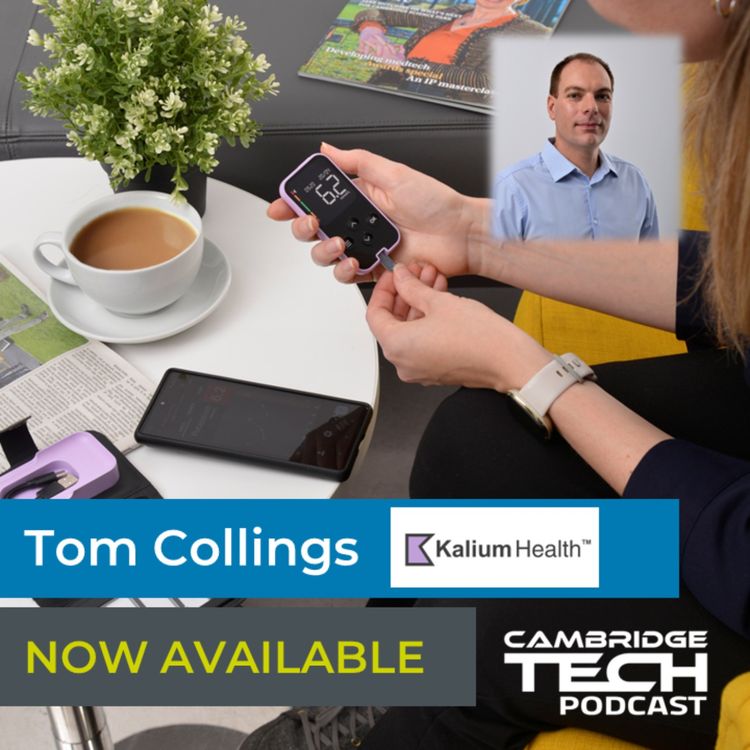
Cambridge Tech Podcast
#CKD with Tom Collings of Kalium Health
Founding CEO Tom Collings talks to us about Kalium Health and managing kidney disease.
Did you know that 800 million people are affected by kidney disease around the world, costing $2 billion to manage kidney disease in US alone?
Tom talks to us about:
· His background as an engineer, to helping startups, to building a company
· Founding the company with three amazing women – Fiona Karet, Tanya Hutter, Liz Norgett,
· His tips to ‘just do it, life is too short to watch for the side lines’ and bringing others along on the journey
· Following Andy Richards well-known narrative that “Cambridge is a low-risk place to do high risk things”
· Manufacturing in Cambridge at prototype scale to get the product into the hands of clinics and clinical services, launching initially in the US
· Initial funding from Cambridge investors – Cambridge Angels, Martlet Capital – any timely opportunities for new professional investors during 2024
· We talk about medical insight and scientific innovation from an original idea to clinical trials.
Tune in to hear all of this, and much more.
Produced by Cambridge TV
More episodes
View all episodes
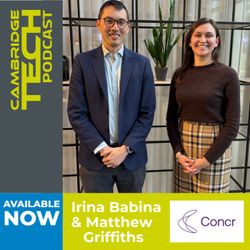
179. How Concr is Revolutionising Cancer Treatment Prediction
31:34||Season 4, Ep. 179Episode 179 hosts Faye Holland and James Parton sit down with Irina Barbina (CEO) and Matthew Griffiths (CTO) to unpick how Concr is using predictive modelling and digital twins to transform cancer drug development.Cancer data is fragmented. Clinical trials, pre-clinical research, and real-world patient data exist in silos. There's no unified way to predict how individual patients will respond to specific therapies, until now.Concr's technology borrows from astrophysics, specifically, how scientists model dark matter using gravitational lensing. The parallel is striking: Astrophysicists can't directly observe dark matter, so they build complex simulations to infer its distribution. Concr can't directly know why a drug worked for a patient, so they build digital twin simulations to predict outcomes.Key innovations:· Bayesian inference at scale to handle messy, incomplete cancer data· Hierarchical modelling that learns from shared biology across cancer types· 94% prediction accuracy on retrospective clinical trial data· Prospective validation underway with NHS partners and pharma companiesConcr dramatically reduces the cost and complexity of clinical trials. This episode brilliantly illustrates why Cambridge is a global innovation hub. It's not just about brilliant science, it's about brilliant people from different disciplines colliding, recognising patterns, and building companies that matter.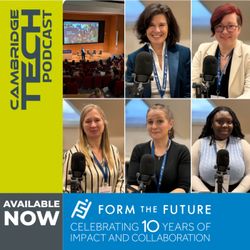
178. Young People and the Future of Work in the Age of AI, with Form the Future
38:18||Season 4, Ep. 178The latest Cambridge Tech Podcast episode tackles one of the most pressing challenges facing the tech industry today: how do we prepare the next generation for a world fundamentally reshaped by artificial intelligence? The Problem Is RealThe statistics are sobering. The UK has 700,000 unemployed graduates struggling to gain a foothold in the labour market. Young people aren't just worried about AI - they're confused and increasingly anxious about their futures. What makes this episode essential listening is the nuanced, multi-stakeholder perspective it brings, including Liz Tolcher, Associate Partner, PA Consulting; Ayeisha Kone-Massouma, Degree Apprentice Project Manager, Bidwells; and those noted below. The podcast brings together educators, employers, policymakers, and AI experts to explore three critical themes:1. Self-Knowledge Over SpecialisationAnne Bailey, CEO & Co-Founder, Form the Future emphasises that young people's greatest asset is self-awareness:"Your uniqueness, your humanity, your curiosity, your interest, your values - these are the things that should be the driving factors in thinking about what work you want to do in the future."2. Foundational Skills Matter MostAgnieszka Iwasiewicz-Wabnig FRSA, Director, Maxwell Centre, University of Cambridge, argues that critical thinking, ethical discernment, and mental agility are non-negotiable:"Invest in foundational skills, invest in exercising your mental capabilities and you will be competitive against any AI."Aga also raises an important tension: over-optimisation for productivity might actually stifle innovation. Without room for experimentation, there's no space for human creativity to thrive.3. Responsible AI Development for ChildrenMaria Luciana Axente, Founder & CEO, Responsible Intelligence, highlights that most technology isn't built with young people in mind. The UK's "age-appropriate design" legislation represents a breakthrough, but urgent action is needed to prioritise children in AI policy and design.Tune in on your chosen podcast platform to subscribe and listen. Headline sponsor Holden Polestar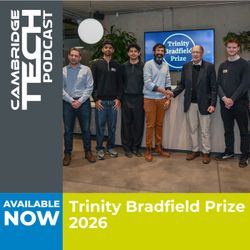
177. Trinity Bradfield Prize 2026: How Cambridge's Best Young Founders Are Solving Climate and Quantum
33:30||Season 4, Ep. 177The Trinity Bradfield Prize is back, and this year's cohort of winners is nothing short of brilliant. If you're a founder, investor, or simply someone who gets excited about deep tech solving real problems, this episode is essential listening.We’ll hear from this year's winners: GreenMixes, Maricene and Phase Shift. And also, from Pinepeak – a returning winner who this year won the Angel Prize.This isn't a feel-good competition recap. It's a masterclass in how rigorous evaluation, technical depth, and genuine community support can nurture founders solving the world's hardest problems. You'll hear directly from founders grappling with real challenges - resource constraints, market uncertainty, and the pressure of scaling - with refreshing honesty.The Trinity Bradfield Prize represents what's possible when universities, investors, and mentors work together to support deep tech innovation.Headline sponsor Holden Polestar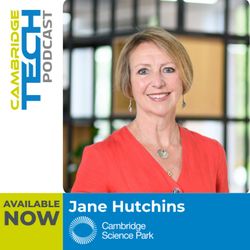
176. Cambridge Science Park at 55 with Jane Hutchins
54:05||Season 4, Ep. 176When Trinity College decided to transform a former farm - complete with redundant railway sidings and stored US Army tanks - into the UK's first science park in 1970, they took a calculated risk that would reshape Cambridge's entire innovation ecosystem. Fast forward 55 years, and Cambridge Science Park remains a masterclass in how to build thriving communities for deep tech and life science companies.We caught up with Jane Hutchins, Director of Cambridge Science Park, on the Cambridge Tech Podcast for an illuminating conversation about what makes science parks tick, why green space matters more than ever, and where the sector is heading next.Whether you're a founder scouting locations, a VC understanding how ecosystems work, or simply curious about how institutions like Trinity College think long-term, this episode delivers genuine insights. Jane's 18-year journey from Southampton to Cambridge - plus her frank discussion of what actually makes companies succeed - is unmissable.Tune in on your chosen podcast platform to subscribe and listen. Headline sponsor Holden Polestar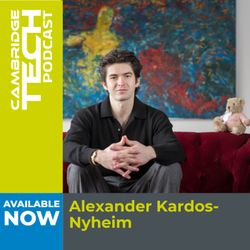
175. From Legal Battle to AI Pioneer with Alexander Kardos-Nyheim
52:57||Season 4, Ep. 175The latest Cambridge Tech Podcast episode is an absolute masterclass in startup strategy, investment psychology, and navigating the cutthroat world of AI talent. Host James Parton and Faye Holland sit down with Alexander Kardos-Nyheim, whose journey from teenage legal warrior to founding an AI company acquired by Thomson Reuters in just two years, is nothing short of remarkable.This episode cuts through the noise of startup hype and delivers genuine, battle-tested insights. Whether you're wrestling with talent acquisition, navigating investor conversations, or trying to build defensible technology in the AI space, Alex's story offers a masterclass in strategic thinking.Episode Highlights:🎯 How to attract world-class talent to your startup💰 Why US and UK investors think completely differently🤖 The three categories of AI talent (and why two don't matter)📚 Building proprietary technology in a big tech-dominated world🏢 Maintaining startup culture post-acquisitionSubscribe to the Cambridge Tech Podcast to hear the full conversation.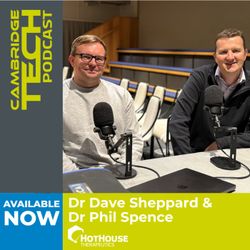
174. Revolutionising Sustainable Medicine Discovery with How HotHouse Therapeutics
48:42||Season 4, Ep. 174Episode 174 of the Cambridge Tech Podcast reveals an extraordinary approach to drug discovery that sounds like science fiction but is very much reality.If you've ever wondered how we might make pharmaceutical manufacturing greener without sacrificing innovation, this week's episode delivers some genuinely exciting answers.HotHouse Therapeutics, a Norwich-based biotech spinout, is harnessing AI and plant biosynthesis to develop the next generation of therapeutic compounds - and they're doing it in greenhouses, not laboratories.Dr Dave Sheppard and D. Phil Spence joined the show to discuss their genuinely innovative approach to drug discovery. "We use AI and plants to make small molecule therapeutics. Plants have evolved these tools over millions of years to make small molecules - we essentially hijack this system and combine tools from different species to make new molecules with therapeutic purposes."We find out about:Compounds that would take synthetic chemists years to produce individuallyUsing greenhouses and vertical farming rather than chemical labsDiscovery projects (finding new compounds) and production projects (scaling hard-to-access natural compounds)HotHouse Therapeutics are not just building a company; they're pioneering an entirely new approach to drug discoveryOpening a funding round this month (January 2026), aimed expansion into additional therapeutic areas (neurodegeneration, oncology), and a continued focus on proving that sustainable drug discovery isn't just better for the planet, it's better for patients too.The team emphasises Norwich's emerging biotech ecosystem, particularly the John Innes Centre, Norwich Research Park, and Anglia Innovation Partnership. With eight team members currently and plans to scale to 20 post-funding, they're committed to keeping operations rooted in Norwich.This is genuinely exciting stuff. If you're interested in deep-tech innovation, sustainable biotech, or just want to hear how AI is enabling entirely new approaches to one of humanity's oldest challenges, this episode is essential listening.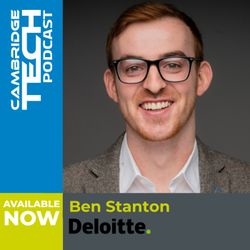
173. 2026 Tech Predictions with Deloitte
46:27||Season 4, Ep. 173Ben Stanton from Deloitte makes his record setting fourth appearance on the podcast to walk us through Deloitte's 2026 Tech (and Media and Telecoms) predictions.The discussion isn’t just a forecast - it’s a sharp analysis of current market trends, user adoption, and technology realities.Key Highlights & Insights:Surging GenAI Adoption – But Reality Lags the Hype:• “Standalone daily usage of GenAI is now about 6% of the population. In London, it’s 40% using it weekly - it’s urban centres and knowledge workers leading the charge.”AI’s Gender Divide is Narrowing:• “We’re far closer to parity: as of April, 53% of men and 42% of women have used GenAI tools.”SaaS Meets AI Agents:• “50% of organisations will be committing half of their digital transformation budgets to AI automation by 2026. Customers will buy in, but only if SaaS platforms develop agentic capabilities at speed.”Agentic AI Poised to Explode:• “There’s an avalanche of interest. Last year we said 25% would launch POCs—now, all it takes is a couple of clicks inside your ERP.”Search Gets an AI Facelift:• “AI-powered search engines now drive three times more discovery than standalone apps. This will reshape how we consume and find information, with huge implications for publishers, marketers, and regulators.”Industrial Robots: Still Hype Over Reality• “There are only 5 million industrial robots in the world - rising to 5.5m by 2026. Humanoid robots? Mostly a science-fiction obsession, not yet a real market.”Tech Sovereignty Spending Accelerates:• “$100 billion will be committed in 2026 to build AI compute infrastructure outside US/China. Yet 90% of global AI compute remains in their hands - a number falling only moderately by 2030.”The Rise of Video Podcasts (Vodcasts):• “The global podcast industry will hit $5 billion this year - driven by video. If you're just audio, you’ll have FOMO. Time for a pivot?”Produced by Cambridge TV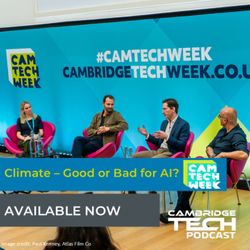
172. AI, Climate, and the Future: Can Cambridge Lead the Way?
44:06||Season 4, Ep. 172As we wrap up an extraordinary year for both AI and climate innovation, this week’s episode delivers an unmissable debate straight from Cambridge Tech Week: “Is climate good or bad for AI?” This thought-provoking episode is essential listening for founders, investors, and anyone passionate about the intersection of technology and sustainability.The lively panel features:• Sara Jones, Head of Marketing, Carbon 13• Jonno Evans, Principal, IQ Capital• Adam Mandel, Entrepreneur in Residence, Carbon 13• Anil Madhavapeddy, Professor of Planetary Computing, University of Cambridge Computer LaboratoryKey Takeaways• AI’s Growing Footprint: Training frontier AI models is massively energy-intensive - think billions of pounds and the equivalent annual power consumption of entire UK counties.• Global Competition & UK’s Role: The US and China dominate in sheer model scale and capital, but the UK can lead with small, efficient models, edge computing, and unique research talent.• Climate Shockwaves: A 2.5ºC world would “fundamentally restructure the world’s global supply chain,” warns Prof. Madhavapeddy.• Sovereign AI & Infrastructure: Expect a world where every country wants their own AI infrastructure - raising urgent questions about energy independence, data localisation, and technological sovereignty.• Hardware & Efficiency Race: Innovations like IPUs and federated learning promise greater sustainability, but as costs drop, usage surges, so efficiency gains may be offset by soaring demand (Jevons’ Paradox in action).Produced by Cambridge TV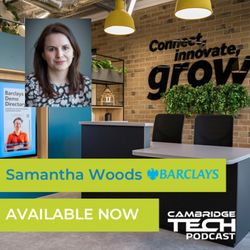
171. How Barclays Eagle Labs is Powering Cambridge’s Climate Tech Revolution
28:32||Season 4, Ep. 171This week we sit down with Samantha Woods, Director of Technology, Media and Telecoms for UK Corporate Banking at Barclays, to explore how Eagle Labs and innovation banking are lighting the way for startups, scale-ups, and the entire local ecosystem.“Banking for all its pretense and purpose is moving money, receiving money, sending money… What I really want to do is enable my clients to do that in the least stressed way possible.”Key takeaways from the episode:• Finding your niche matters – Sam emphasizes making your passion visible and building the right advocates, whether you’re a founder or growing your career.• Eagle Labs as a community engine – Since 2015, Barclays’ Labs have grown to 43 UK locations, offering workspaces, mentorship, and sector-focused hubs. Cambridge is now a national climate tech hub.• Support at every stage – From online Founders’ Academy courses to accelerators for female and black founders, and sector-specific programmes, Labs help startups go from idea to IPO.• Demo Directory & investor visibility – A platform where startups pitch directly to investors, turning ideas into funding opportunities.• Facing the funding gap – Sam highlights the UK’s scale-up challenge: strong innovation but limited domestic growth capital, especially compared to the US.• Sustainable innovation in action – Cambridge Eagle Lab itself is a retrofitted, solar-powered space demonstrating the kind of climate tech solutions it supports.For anyone building, scaling, or funding a tech business in Cambridge, this episode offers both practical insight and a sense of community momentum.Produced by Cambridge TV